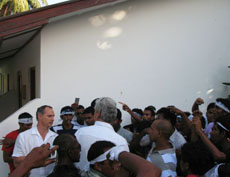Ambitious plans by Lithuanian mega-brand Olialia to develop an ‘all blondes’ resort – in the shape of a gigantic high-heeled shoe – have entered phase two, after the company reported that a delegation had visited the Maldives and selected three islands suitable for the project.
Olialia did not reveal the name of the islands, but did publish CGI images of the planned resort, designed by “famous Lithuanian architect” Valerijus Starkovskis, and claimed it that construction would begin “in a few years” with a grand opening in 2015.
Tenders for operators of the hotel, restaurants and serivce providers “would be announced soon”, the company said, also claiming that it would hold a “worldwide competition” to select the manager of the blonde island, “which every citizen in the world will be able to participate in.”
Aside from reclaiming an island in the shape of women’s footwear, the present draft includes an initial 61 guest villas, several restaurants, a nightclub, a beauty salon and spa centers, a marina, a boardwalk, mall, helipad and a “centre of harmony and psychology”. Olialia said it intends to eventually increase the resort to 500 rooms.
The central gimmick of the proposal is to staff the resort entirely with blondes and ensure all buildings “comply with the spirit and the worldview of blondes”, because, according to Olialia’s managing director Giedre Pukiene, “blondes are a great power that should not be underestimated. We are smart, beautiful, reckless and purposeful.”

In addition to the resort, a specially designed charter airline staffed only by blondes, ‘Olialia airlines’, will deliver tourists to the island, Pukiene claimed.
Investors apparently include interests in Lithuania, Russia, UK, Germany, the United Arab Emirates and an as-yet undisclosed Maldivian travel company.
Olialia is a highly recognisable brand within Lithuania with a reported income of $US10 million. It claims to be an Eastern European version of Richard Branson’s Virgin company, and is well known for its gratuitous use of blonde women in its marketing. The company now markets an assortment of products ranging from Cola and Italian pizza restaurants to luxury limousines, a nightclub and a (blonde) modelling agency.
Olialia made headlines worldwide in September after it first proposed the Maldives resort concept, sparking heated debate over whether such a resort would be discriminatory or too controversial for the country’s conservative self-image – or even whether the whole idea was a devious marketing gimmick.
If legitimate, the resort faces several practical obstacles – the first being that so far, the Maldivian Tourism Ministry knows nothing about the project.
“I’m sure I would have heard about this,” said Minister of Tourism Mariyam Zulfa, adding that such project would eventually pass through the tourism ministry, be subject to the Tourism Act and ultimately require cabinet approval “and debate over the various merits and demerits.”
However, she said, the government “promoted private enterprise, and was not in the [business] of either killing or encouraging ideas. What a private party does is their prerogative and we do not interfere in how resorts are run.”
After lowering cabinet’s raised eyebrows, a second challenge for Olialia would be Maldivian employment regulations, which state that resorts must employ a minimum of 50 percent Maldivian staff – few of whom are naturally blonde.
Thirdly, several local marine biologists contacted by Minivan News who were shown images of Olialia’s resort pronounced it “ridiculous”.
“I couldn’t comment until I see the shape of the original island,” said one, “but there’s no visible beach protection and the island would suffer from huge erosion – the beach would just disappear – while sedimentation could kill the surrounding reef.”
“I don’t know if I should laugh about it or cry about the degradation of human species,” said another, after seeing the images.
Nonetheless should the Maldives hesitate in its embrace of the concept, “we have received offers of cooperation from the owners of islands in Greece and the Carribean,” Pukiene noted.
“Currently, the experts are studying the benefits of 12 islands. We do not exclude the possibility of opening several blondes resorts, because the interest in the project is huge.”
